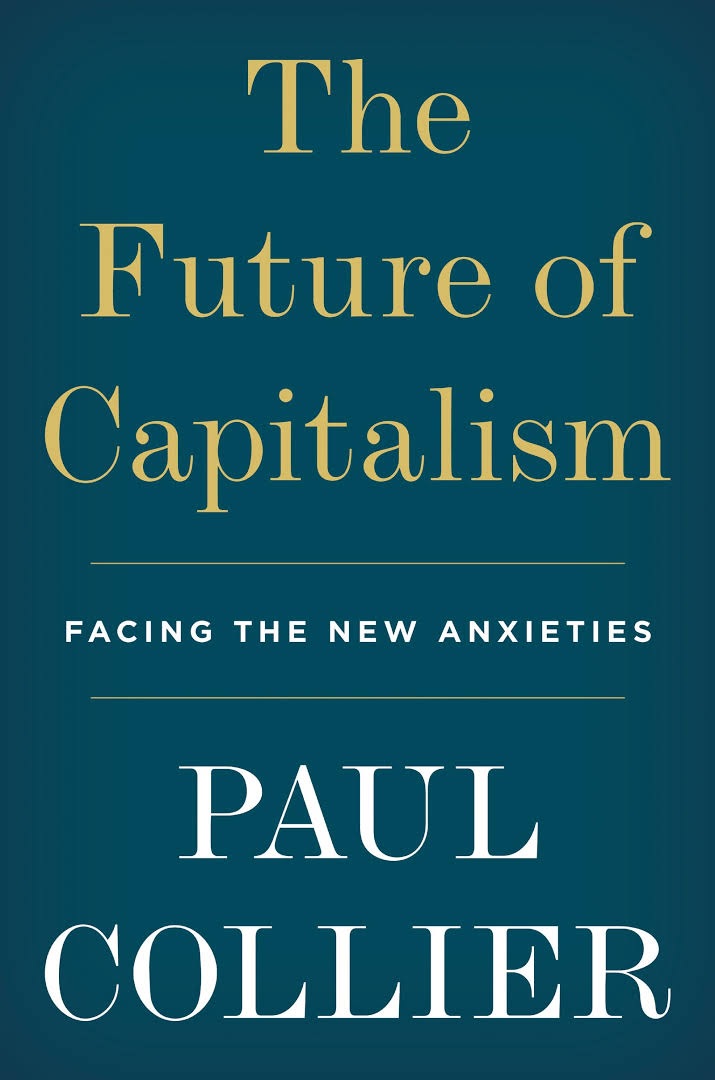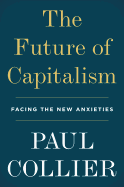 Capitalism is worth saving, economist Paul Collier argues in his provocative treatise The Future of Capitalism: Facing the New Anxieties.
Capitalism is worth saving, economist Paul Collier argues in his provocative treatise The Future of Capitalism: Facing the New Anxieties.
Collier (The Bottom Billion) eschews what he calls the enemies of progress--ideology and populism--for a pragmatic, evidence-based approach that attempts to answer why capitalism has gone askew in the last 50 years and what can be done to right the ship. The book is split into four sections, offering a diagnosis of the problem and the author's "practical" solutions, though the latter come with a good amount of philosophizing. Wide-ranging, the book touches upon fiscal policy, geopolitics, education, trade and a host of other issues.
Collier's initial diagnosis is that growing inequality in the world, especially in the developed world, is a result of failed policies across the political spectrum. He argues the left has propped up a vacuous paternalist state that has failed to help the most vulnerable, while the right has touted a detrimental market fundamentalism that has put huge swaths of people in economic devastation. The crisis can be seen around the world, as manifested in a growing class divide and stark demographic divisions between booming metropolises and impoverished provinces.
Collier's answer to the problem is to return to the communitarian ideal of social democracy that drove economic growth from the end of World War II through 1970. He calls this political philosophy "social maternalism," a concept that focuses on using both private and public resources to cultivate and nourish upward mobility. One of the best examples of social maternalism is a set of proactive policies for single, low-income mothers that offers mentoring and counseling instead of punitive state action.
To fix capitalism, two of Collier's proposals especially stand out. The first is a change to corporate law that forces the public interest to be represented on all corporate boards, helping to maintain what Collier calls the "ethical firm"--that is, corporations that work for the common good, not just profit. The second is to tax land appreciation in booming metropolises and redistribute the income to failing provinces. For example, a tax on New York markets could be redistributed to Detroit and other ailing cities in the Rust Belt.
Two places where the book falls short are on immigration and LGBT rights. Collier gives a somewhat cold economic account of why immigration doesn't help native citizens but fails to dive into the root causes of immigration, or the causes of Trumpist nativism, for that matter. And while he devotes a whole chapter to the "ethical family," arguing for the strength of two-parent households, he neglects to include same-sex marriages.
Throughout the book, Collier passionately argues for a shared identity and a return to "reciprocal obligations," an ethical citizenry helping each other in the civic process. The Future of Capitalism will spark plenty of debate and enliven our political discourse. --Scott Neuffer, writer, poet, editor of trampset
Shelf Talker: Economist Paul Collier critiques the ills of modern capitalism and offers a vision for the future that involves practical solutions.






IPC.0204.S3.INDIEPRESSMONTHCONTEST.gif)



 Nicholas Polsinelli has purchased the
Nicholas Polsinelli has purchased the 

 Last Thursday, the American Booksellers Association's e-newsletter edition of the Indie Next List for November was delivered to more than half a million of the country's best book readers. The newsletter was sent to customers of 133 independent bookstores, with a combined total of 503,421 subscribers.
Last Thursday, the American Booksellers Association's e-newsletter edition of the Indie Next List for November was delivered to more than half a million of the country's best book readers. The newsletter was sent to customers of 133 independent bookstores, with a combined total of 503,421 subscribers.
 Last week,
Last week, 
 The Untethered Soul: A 52-Card Deck
The Untethered Soul: A 52-Card Deck Capitalism is worth saving, economist Paul Collier argues in his provocative treatise The Future of Capitalism: Facing the New Anxieties.
Capitalism is worth saving, economist Paul Collier argues in his provocative treatise The Future of Capitalism: Facing the New Anxieties.